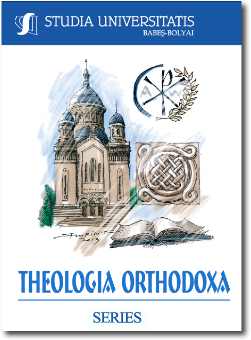TOHU WABOHU IN GENESIS 1, 2. KABBALISTIC, PATRISTIC AND MODERN EXEGESIS
TOHU WABOHU IN GENESIS 1, 2. KABBALISTIC, PATRISTIC AND MODERN EXEGESIS
Author(s): Grigore Dinu MoşSubject(s): Theology and Religion
Published by: Studia Universitatis Babes-Bolyai
Keywords: tohu wabohu; waste; void; formless; chaos; creation; indeterminacy.
Summary/Abstract: The study presents the views of some important representatives of the Jewish, patristic and contemporary exegesis of the tohu wabohu (Genesis 1, 2). The exegesis of the expression is important because it raises, in the context of the first two verses of Genesis, the question of the way in which God created the world: from nothing or from a pre-existing chaos. I found many translations and interpretations of tohu wabohu: chaos (Jeremiah’s understanding, Jer 4: 23-26), balance between the infinite creativity of God and the limited receptivity of the pure space (Kabbalistic view), invisible and unformed (LXX and the Greek Fathers), waste, void, desert, chaos, nothingness, formless, empty (most of the contemporary exegetes). The various interpretations of the concept were usually determined by the more general view of Genesis 1: the descriptive view; the chronological view, the gap theory, the framework view or the dynamic ontological view; the liturgical, poetic and spiritual view. I found Westermann’s and Brueggemann’s hermeneutical positions accurate, honest and convincing: we do not need to choose between creation from nothing and creation from a pre-existing chaos, because the Hebrew text is in fact richer if we ignore or overlook this conceptual limitation. Based on its apophatic vision, Orthodox theology can accept these hermeneutics, because the conceptual “antinomy” can be a way to overcome the limits of human reason. Ontologically speaking, the primordial nothingness or abyss could be understood as the infinite “kenosis” of the absolute and infinite Logos. This can be the ultimate antinomy, the last limit of thought, because when we affirm the infinite “kenosis” of the divine Logos, we must affirm the absolutely affirmative and “enstatic” character of God, who admits no negation and no change within Him. I also appreciated the interpretations which accepted the idea of a primordial chaos created by God, because these interpretations allow a dialogue between the biblical cosmology and the scientific cosmology; at the same time, they offer many possibilities for application in the spiritual life and for improving faith. Why did God create the world in this way? Because only in a world that has degrees of indeterminacy in its inner structure can a real freedom be possible for human beings.
Journal: Studia Universitatis Babes-Bolyai - Theologia Orthodoxa
- Issue Year: LXII/2017
- Issue No: 2
- Page Range: 5-20
- Page Count: 16
- Language: English

